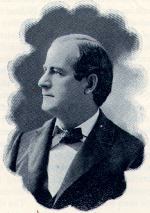|
224
|
LEGISLATIVE YEAR
BOOK
|
|
Trumbull. He began the practice of his profession and
removed to Lincoln in 1887, where he became a member of the
firm of Talbot & Bryan. He never held political office
prior to his election to the fifty-second congress. At the
close of his first term he was re-elected. He began
congressional life March 4, 1891, at the age of thirty, and
was at once honored with a place on the committee on ways
and means. He took an active part in the preparation of the
celebrated Wilson tariff bill in the fifty-third congress,
and was the author of the income tax law. His maiden speech
was delivered in the house March 16, 1892, on the free wool
bill, and from that time he was recognized as one of the
advanced thinkers and speakers of the country. Mr. Bryan
closed the debate on the income tax January 30, 1894, making
such a popular impression that many thousand copies of that
speech were circulated by the democratic congressional
committee. On the 16th day of August, 1893, he delivered his
famous speech against the unconditional repeal of the
purchasing clause of the Sherman bill. This was by many
members of congress and by the press of the country regarded
as one of the highest among the brilliant oratorical efforts
heard in congress in the last quarter of a century. His
silver and tariff speeches have been widely circulated. The
short speech delivered in opposition to "unconditional
repeal," after the amended bill came back from the senate,
foretold the events which have followed repeal, and serves
to vindicate his judgment and to prove his keen insight into
the financial condition of the country.
Although defeated for the United States
senate in 1895, he continued the leading exponent of the
principle
|




